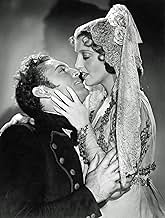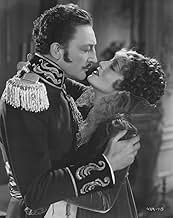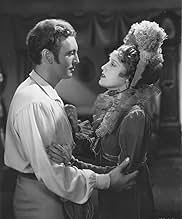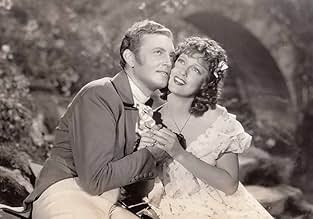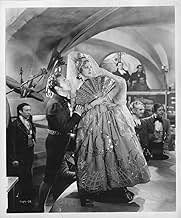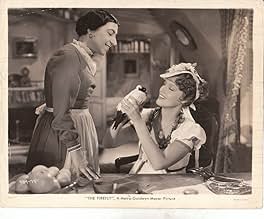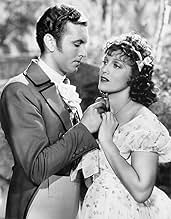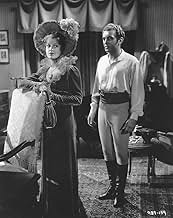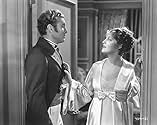NOTE IMDb
6,8/10
445
MA NOTE
Pendant les guerres napoléoniennes, les aventures et les amours d'une espionne espagnole, chanteuse de cabaret.Pendant les guerres napoléoniennes, les aventures et les amours d'une espionne espagnole, chanteuse de cabaret.Pendant les guerres napoléoniennes, les aventures et les amours d'une espionne espagnole, chanteuse de cabaret.
- Réalisation
- Scénario
- Casting principal
- Récompenses
- 3 victoires au total
Douglass Dumbrille
- Marquis de Melito
- (as Douglas Dumbrille)
Tom Rutherford
- King Ferdinard
- (as Tom Rutherfurd)
Corbet Morris
- Duval
- (as Corbett Morris)
Victor Adams
- Jail Guard
- (non crédité)
Monya Andre
- Civilian Wife
- (non crédité)
Sam Appel
- Fruit Vendor
- (non crédité)
Pilar Arcos
- Gypsy
- (non crédité)
Hooper Atchley
- French Soldier Requesting Flowers
- (non crédité)
Avis à la une
10guidon7
Wonderful mix of music, romance and comedy but I concede a trifle too long, the length however acceptable with these two. Jeanette MacDonald could do everything; sing beautifully, act as well and surprisingly (I just watched this one after many years) a gifted dancer. MacDonald and Jones are quite compatible and I can see where, had fate taken a hand, it could have been these two and not Nelson Eddy, not to downgrade Nelson's resonant baritone in any way. Allan Jones was a better actor, and was one of the finest tenors in movie history. There was one brief comic bit I found hilarious -- it was so short it may have been overlooked by many. Don Diego (Allan Jones) is singing the famous Donkey Serenade to MacDonald as she rides along in a coach. He sings the line "But try as she may, in her voice there's a flaw", to this jibe at her voice, Jeanette's displeasure shows in a grimace! The expert supporting cast is up to MGM'S standards; Warren William, Billy Gilbert, George Zucco, Douglas Dumbrille, Henry Daniell and even a one-line appearance by Ralph Byrd (a.k.a. Dick Tracy in the 1940's). I highly recommend this film, especially to fans of light operetta. The music is delightful and Jeanette and Allan give it their all. Jones' last appearance was a 1980 role on the Love Boat TV program. Upon retirement from the screen (big screen and little) he became a dentist, quite a surprise. I wonder if he sang for his patients? If he did I'm sure his waiting list was the envy of his fellow dentists.
If it wasn't for "Donkey Serenade", this would have been a total loss as a piece of gaudy MGM entertainment for the masses in the 1930s. JEANETTE MacDONALD gives her all as a sexy spy who tries getting potentially harmful information from French officers, but it's all pretty preposterous and finally much too long for sustained interest.
The only sequence that comes off as completely charming is the "Donkey Serenade" episode with ALLAN JONES singing his heart out as he rides a dusty trail following her carriage. Jones is a fine match for MacDonald but probably left MGM when he realized it was Nelson Eddy's territory.
The score is kind of lackluster, the sets are opulent in typical MGM grand style manner, but the plot is never lively enough to keep one's attention riveted on the plodding story of spies and counter-spies in ye olde Spain. Everyone tries hard, but it just seems to stall somewhere near the middle and never recovers.
Trivia: Did Jeanette MacDonald ever show her real hair in a costume film? She must wear at least 25 wigs and hairdos in this film alone, changing her far from simple hairstyles from scene to scene more often than Lana Turner ever changed her costumes in glamorous roles. There must have been a special Jeanette wig department at Metro just for the occasion.
The only sequence that comes off as completely charming is the "Donkey Serenade" episode with ALLAN JONES singing his heart out as he rides a dusty trail following her carriage. Jones is a fine match for MacDonald but probably left MGM when he realized it was Nelson Eddy's territory.
The score is kind of lackluster, the sets are opulent in typical MGM grand style manner, but the plot is never lively enough to keep one's attention riveted on the plodding story of spies and counter-spies in ye olde Spain. Everyone tries hard, but it just seems to stall somewhere near the middle and never recovers.
Trivia: Did Jeanette MacDonald ever show her real hair in a costume film? She must wear at least 25 wigs and hairdos in this film alone, changing her far from simple hairstyles from scene to scene more often than Lana Turner ever changed her costumes in glamorous roles. There must have been a special Jeanette wig department at Metro just for the occasion.
I am told that the original plot of The Firefly has seen on Broadway back in 1912 had absolutely nothing to do with the Peninsular Campaign of the Napoleonic Wars. Hard to believe because the plot here seems so right.
The core of the plot is duty to one's country. Though Allan Jones and Jeanette MacDonald are on opposite sides and love each other, at some point each betrays the other at some point in the movie to gain a tactical advantage for France or Spain.
The Rudolf Friml-Otto Harbach-Oscar Hammerstein II, is mostly retained for the movie. One new song, based on a Friml instrumental composition called Chanson, is given a lyric by Bob Wright and Chet Forrest and arranged by MGM's house composer Herbert Stothart. Their combined efforts yielded The Donkey Serenade and provided Allan Jones a signature song for the rest of his career.
Jeanette was taking a rest from her usual singing partner, Nelson Eddy, and her teaming with Jones was felicitous. They are a pair of winning songbirds. Maybe had Jones stayed with MGM, he and MacDonald might have made some more films together. Maybe he might have played some of the parts that Nelson Eddy did opposite her. But he probably was right in thinking he'd always be number 2 at MGM, so he moved to Universal.
Beautiful singing and a decent plot in this one. Go see it.
The core of the plot is duty to one's country. Though Allan Jones and Jeanette MacDonald are on opposite sides and love each other, at some point each betrays the other at some point in the movie to gain a tactical advantage for France or Spain.
The Rudolf Friml-Otto Harbach-Oscar Hammerstein II, is mostly retained for the movie. One new song, based on a Friml instrumental composition called Chanson, is given a lyric by Bob Wright and Chet Forrest and arranged by MGM's house composer Herbert Stothart. Their combined efforts yielded The Donkey Serenade and provided Allan Jones a signature song for the rest of his career.
Jeanette was taking a rest from her usual singing partner, Nelson Eddy, and her teaming with Jones was felicitous. They are a pair of winning songbirds. Maybe had Jones stayed with MGM, he and MacDonald might have made some more films together. Maybe he might have played some of the parts that Nelson Eddy did opposite her. But he probably was right in thinking he'd always be number 2 at MGM, so he moved to Universal.
Beautiful singing and a decent plot in this one. Go see it.
Jeannette MacDonald and Allan Jones star with Warren William in "The Firefly," a 1937 MGM film.
MacDonald plays Nina Maria Azara, a singer, who is also a spy for Spain during the Napoleonic Wars. She is to seduce French officers and find out Napoleon's plans for Spain.
She meets Don Diego, who pursues her while she is working as a singer. She has to stave him off in order to meet with those who can give her information, among them Major de Rouchemont (William).
Don Diego keeps showing up, including on her trip to Bayonne. There, the famous Donkey Serenade is introduced. Unknown to her, Don Diego is actually Captain Andre, who is sent to Spain to spy on her.
The story is a backdrop for all of the music, and there is a ton of it. MacDonald's voice was highly touted; with today's ears, it was a lovely voice, particularly in the middle, but I was never crazy about her top notes. I think it was just the way women were trained by then. She was a beautiful woman and a fine, fiery actress, and her popularity was well deserved. She does a good job here.
Allan Jones was not the most sparkling presence -- he certainly was no match for MacDonald in that department -- but he truly had a beautiful voice. Warren William was very good in a villainous role.
Most of the music was written by Rudolf Friml and Herbert Stothart, so you need to like operetta in order to like this film, and also classical voices.
MacDonald plays Nina Maria Azara, a singer, who is also a spy for Spain during the Napoleonic Wars. She is to seduce French officers and find out Napoleon's plans for Spain.
She meets Don Diego, who pursues her while she is working as a singer. She has to stave him off in order to meet with those who can give her information, among them Major de Rouchemont (William).
Don Diego keeps showing up, including on her trip to Bayonne. There, the famous Donkey Serenade is introduced. Unknown to her, Don Diego is actually Captain Andre, who is sent to Spain to spy on her.
The story is a backdrop for all of the music, and there is a ton of it. MacDonald's voice was highly touted; with today's ears, it was a lovely voice, particularly in the middle, but I was never crazy about her top notes. I think it was just the way women were trained by then. She was a beautiful woman and a fine, fiery actress, and her popularity was well deserved. She does a good job here.
Allan Jones was not the most sparkling presence -- he certainly was no match for MacDonald in that department -- but he truly had a beautiful voice. Warren William was very good in a villainous role.
Most of the music was written by Rudolf Friml and Herbert Stothart, so you need to like operetta in order to like this film, and also classical voices.
Spy-thrilla where Jeannette MacDonald must get napoleonic soldiers to reveal their secrets. Warren Williams (The Lone Wolf!) is the Major; Billy Gilbert who sneezed his way through films is the innkeeper. Douglass Dumbrille always played the bad guy, and here is the Marquis. Dance numbers, singing. It's Jeanette MacDonald, who always does operatic arias. Yawn. Pretty dated stuff. Intrigue. suspense. love triangles. It's a pretty dry period piece, which is never my first choice. Kind of a mata hari. Showing on Turner Classics. It's pretty well done, but moves pretty slowly. the songs keep bringing it to a screeching halt. I'd skip this one unless you're a fan of J. MacDonald. Directed by Robert Leonard... nominated twice, but never got the Oscar.
Le saviez-vous
- AnecdotesThe song "The Donkey Serenade" was not in the original stage production. It was written for the film, but the music was adapted from the song "Chansonette," from the stage version of "The Firefly."
- GaffesWhen by the bridge we see a female with very long black plaits walking with her beau across the bridge. Not long after we see a closer shot of them about to walk across the bridge.
- Citations
Don Diego: You have one bad habit.
Nina Maria Azara: Oh, yes? What?
Don Diego: You're always saying good-bye.
Nina Maria Azara: Very well then, I won't say good-bye. I'll just go!
- Crédits fousEach time the dancing girls dance across the screen, a new screen credit is revealed.
- ConnexionsFeatured in MGM Parade: Épisode #1.25 (1955)
- Bandes originalesLove Is Like a Firefly
(uncredited)
Music by Rudolf Friml
Lyrics by Bob Wright and Chet Forrest
Sung by Jeanette MacDonald
Meilleurs choix
Connectez-vous pour évaluer et suivre la liste de favoris afin de recevoir des recommandations personnalisées
Détails
- Durée
- 2h 11min(131 min)
- Rapport de forme
- 1.37 : 1
Contribuer à cette page
Suggérer une modification ou ajouter du contenu manquant


